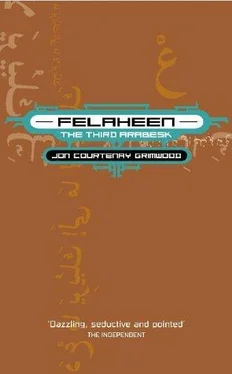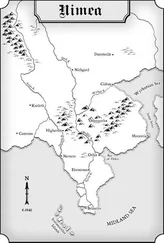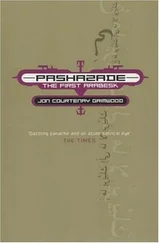Catering to Soviet tourists was entirely different to there being any. Hani realized this as soon as she pushed her way through the shop's bead curtain and found the place empty, apart, that was, from an old man with what looked like the inward stare of a mystic or kif smoker. Although, it turned out to be neither because when Hani got closer, she realized his eyes were milky with cataracts.
"Saháh de-kháyr," she said politely.
"Saháh de-kháyr," he replied, then added, "Es-salám aláykum."
So Hani had to start all over, replying and to you peace , before rewishing him good day. Formalities complete, she stopped, unsure how to continue. She could see what she thought she needed on a shelf behind the counter, low down and almost out of sight.
The man waited while Hani opened and shut her mouth so often she was in danger of turning into one of Zara's promised carp.
"Telephone?" she muttered finally.
Absolute silence greeted this request.
Pulling a note from her pocket, Hani held it out to the old man. The note was American, a five-dollar bill.
The man called something over his shoulder and a young woman appeared, hastily wrapping her scarf around her head. Only to relax slightly when she discovered her customer was a child.
"Telephone?" Hani repeated.
Taking the bill from the man's hands she held it up to the light and slipped it quickly into her dress pocket. Man and woman had a hasty conversation, so fast and so low that overhearing was impossible. Whatever the content, they seemed to reach a conclusion.
"No telephone," said the woman. "Not here. But I take you . . ." She gestured towards the rear and Hani realized that she was meant to follow. For about fifty paces she fought her way down a busy back alley, then the woman steered her towards a small door set in a crumbling wall.
"Through here," she said, as she pushed Hani ahead of her, shouting "Hamid!" as they came out into a small courtyard.
A second yell produced a head peering from an upstairs window. Another burst of conversation followed in what Hani finally realized was chelha , the original dialect of Kairouan's Berber inhabitants.
"Where do you want to call?" asked the woman, tossing Hani's answer up to the boy, then stopping for his reply.
"El Iskandryia we can do," she agreed, "but it will cost more than five dollars . . ."
Reluctantly Hani peeled another note from the roll in her dress pocket and palmed it into a small square before making a pretence of searching her remaining pockets, muttering crossly all the while.
"My last one," she said.
The cell phone was a Siemens. Unquestionably illegal in a country where all cell phones had to be registered with the police.
"Two minutes," said the woman, "call me when you're done." And she vanished into the house to give the foreign girl some privacy. The boy remained sitting on a stone bench next to the courtyard entrance just to make sure Hani didn't suddenly disappear with his phone.
Hani could just imagine it. Donna stood in the kitchen surrounded by pans, trying to ignore the buzz of the coms screen, Zara out shopping and Khartoum lost in thought or rereading tales of the Ineffable Mullah Nasrudin, all of which he already knew by heart.
She sighed.
The message Hani left was simple. She was in Kairouan with her uncle. On her way to Tozeur. There was nothing to worry about.
"Where have you been?" Murad demanded when Hani finally got back.
"Getting these," said Hani, handing him a cardboard dish of makrouth , lozenge-shaped sweetmeats filled with date paste. She dropped a cheap paper napkin next to his knee and clambered up into the huge Bugatti. The rest of the napkins she stuffed into a side pocket. She let Murad eat the sweetmeats because, unfortunately, even after her walk her tummy still had cramps.
CHAPTER 37
Thursday 3rd March
Second coffee. That was how Eduardo counted his days. First coffee, second coffee, third coffee . . .
The first always found Eduardo listening to IskTV. While others watched the newsfeed avid for every close-up, Eduardo listened carefully as he doodled hats and moustaches onto pictures in Iskandryia Today or filled in the Os in every headline.
The Emir of Tunis had been taken into protective custody following the declaration of martial law in Ifriqiya. The story was in his paper as well as on-screen. Iskandryia Today treated this as news while IskTV assumed it was background, leading with a different story. One that had His Excellency Kashif Pasha, the Emir's eldest son, swearing that his father was alive, safe and would remain that way. Apparently Kashif Pasha swore this on his life.
What IskTV found interesting was the fact that this promise was relayed on Kashif's behalf by a half brother, Ashraf al-Mansur, who personally visited the Mosque de trois ports in Kairouan to pass the message to the head of the Assiou Brotherhood.
The head of the brotherhood had, as requested, released Kashif Pasha's promise to the world.
So Eduardo wasn't surprised to receive a scrambled call just after second coffee. Although it took him a moment to remember that he needed to connect an optic from the silver Seiko he wore to the computer on his desk. That was what the man had told him to do, plug in as soon as Eduardo heard the hiss and never try to make a connection using infrared. Which was fine, because Eduardo wouldn't have known where to start.
A doctor at the Imperial Free once suggested Eduardo reduce his coffee intake to one cup a day but Eduardo had barely paused to consider this. The man was a foreigner, newly arrived in the city, and would learn. No one who actually lived in El Isk for longer than a week could have made that suggestion.
Instead, Eduardo had agreed with himself to cut his intake to eight cups a day. This wasn't always possible, given the nature of his job; but his success or failure gave Eduardo something to talk about to Rose, a mild-natured whore he'd met a few months earlier, when the man sent him to do a job at Maison 52, Pascal Coste.
Rose claimed to be English and, although she had the hips and buttocks of an Egyptian, the smallness of her breasts convinced Eduardo that this might be the truth. As did the half-smoked Ziganov forever hanging from her fingers, its gold band stained with lipstick. In Iskandryia, even licensed whores didn't smoke in public.
But then women tended not to visit cafés either. Unless it was one of those expensive places around Place Saad Zaghloul like Le Trianon, where ordinary rules seemed not to apply. Money did that, Eduardo had decided. It rewrote the rules. Or perhaps it just remade them into something so complex and discreet that ordinary people like him no longer understood what they were. The man was like that, governed by rules Eduardo took on trust.
Eduardo's office was above a haberdasher's at the back of a bus station on Place Zaghloul. The place was a walk-up with winding stairs and a toilet on the half landing, which Eduardo had to share with the shop below. It had a melamine desk, a cheap chair in black plastic that looked almost like leather and a grey metal filing cabinet. Plus a state-of-the-art computer, quite out of keeping with the rest of the furniture.
The computer lived on a side table. Well, it would have been a side table if it hadn't actually been an old door supported at either end by plinths of crudely mortared bricks. Eduardo, whose work it was, had tried to apologize for its ugliness but the man had waved away Eduardo's explanation. It seemed Ashraf Bey liked the door/table combination more than he liked anything else in the office.
Sharing Eduardo's office space were two cockroaches and a colony of ants who dwindled come autumn and, Eduardo imagined, would be back with the spring. He wasn't sure, not having had the place long enough to find out. The cockroaches remained, however, sharing his desk and living off a diet of sugar that fell from Eduardo's morning doughnut.
Читать дальше












